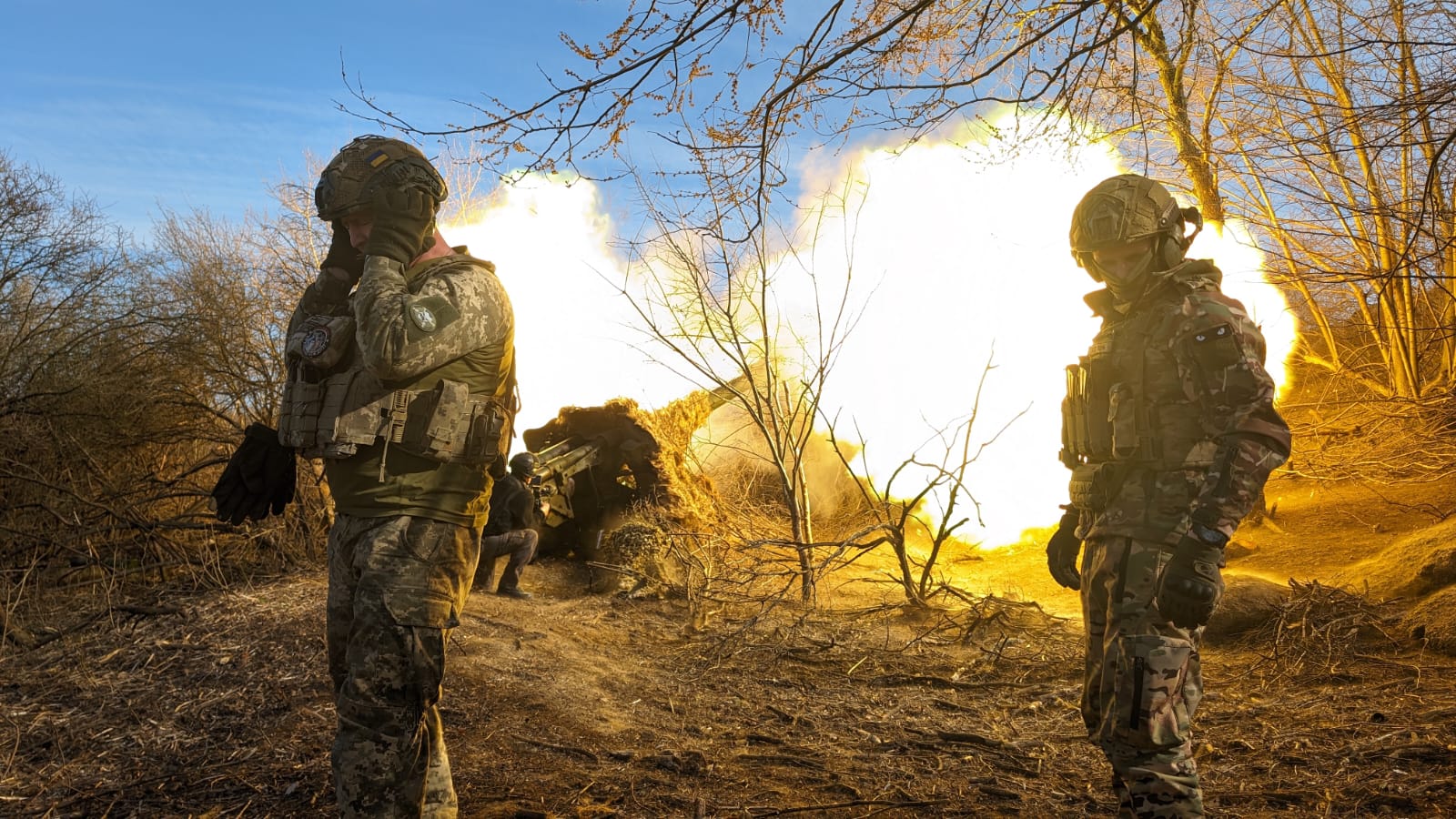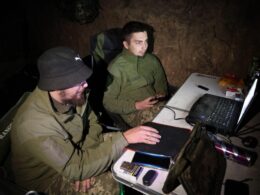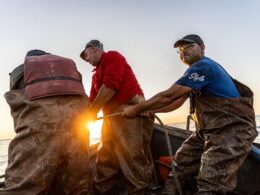A dugout is still. Two men are curled in sleeping bags on folded beds, their heads covered. It is 4.30 am. Outside is dark and cold. Our film crew just drove through the fields: the road from Kherson was under artillery fire and drone attacks. The truck jumped up and down and the grass glistened in the moonlight.
The golden-yellow light reflects from the cardboard walls. The place is not cozy but neat, dry, and warm, at least at first. It smells clean. Dima, one of the fighters, gives us a house tour: pine logs for the roof, he explains. Pinewood is popular as the tar connects the fiber, the wood is soft, has a high viscosity, and shrapnel gets stuck in it.
Filming artillery fire. Photo: Zarina Zabrisky.
Dima is concerned about the loss of forests, even though Ukraine has lots of pine woods. The wall above the mobile oven is all black earth and light local coquina rock, a mix of crushed seashells and white clay. Digging a 2.5-meter deep space in that rocky soil requires an excavator and might take a few days to over a week. As it is in the open, the Russian drones can easily attack the soldiers before the dugout is ready.
We are here to film the work of artillery. This used to be a mortar platoon but during the liberation of Kherson, they found a trophy 1950s Russian D-20, 152 mm gun-howitzer near Tyahinka, Kherson Oblast.
They fixed the broken gun, found the missing parts, and towed it around for half a year, while still using mortar weapons. They learned to operate it using YouTube manuals. Nobody here had proper military training.
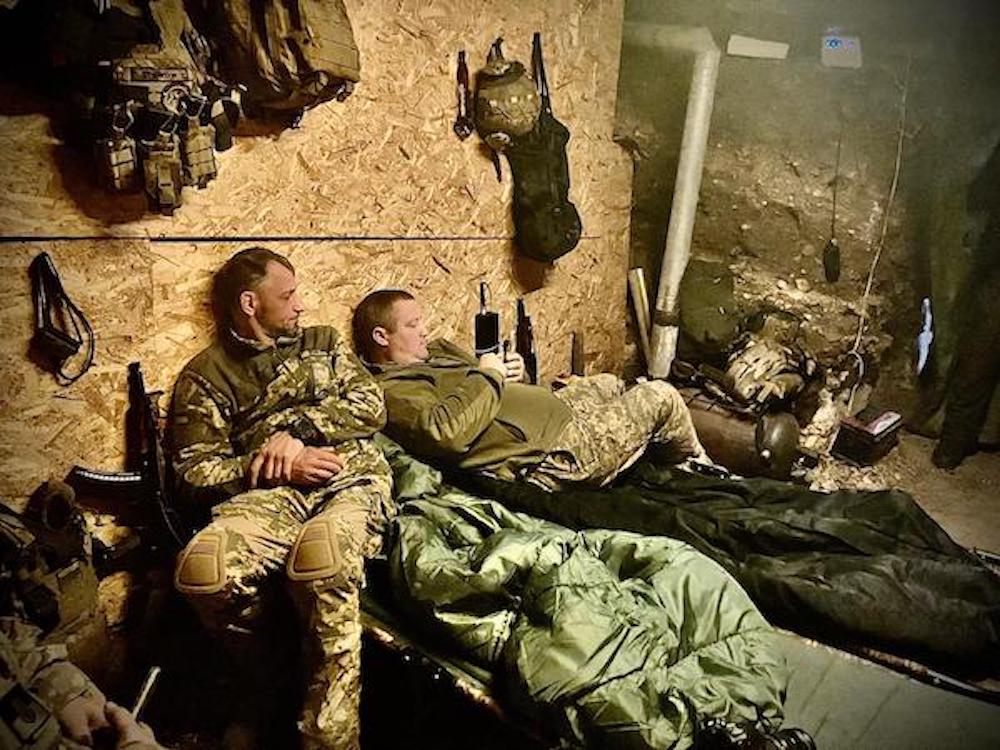
Before the Russians invaded, Dima was a welder and metal worker at a shipbuilding factory in a village near Odesa. Stiopa, a driver, owned cows, pigs, chickens, and ducks. Andriy, the youngest one, is also from a village but studied in Odesa and worked at a construction site to make ends meet. He was going to be a political analyst, but the Russians invaded. Sasha was a trucker who drove grain to Odesa ports from Western Ukraine.
“We lived well,” says Dima. “Then, the damn Russians came and destroyed everything. ‘Liberating’ us from ourselves.”
The 126th Separate Territorial Defense Brigade was formed during the first two weeks of the Russian full-scale invasion, on 9 March 2022, in the Odesa Oblast as volunteers rushed to mobilization centers to defend their land.
For the first three months, the volunteers trained, using make-shift fake mortars made of stools and plastic sewage pipes. Some commanders fought the Russian invasion in 2014 in Donbas and taught the recruits the necessary skills. The platoon commander knew how to calculate the enemy’s position by the sound of shells and by the light.
When the brigade was formally recognized on 23 March 2022, it got its first combat task to protect critical infrastructure in the Odesa Oblast. In May, the brigade moved to defend the Mykolaiv Oblast and was among the forces liberating Kherson by November 2022. There, the commander of the platoon blew up on a land mine, along with three other officers and a sapper.
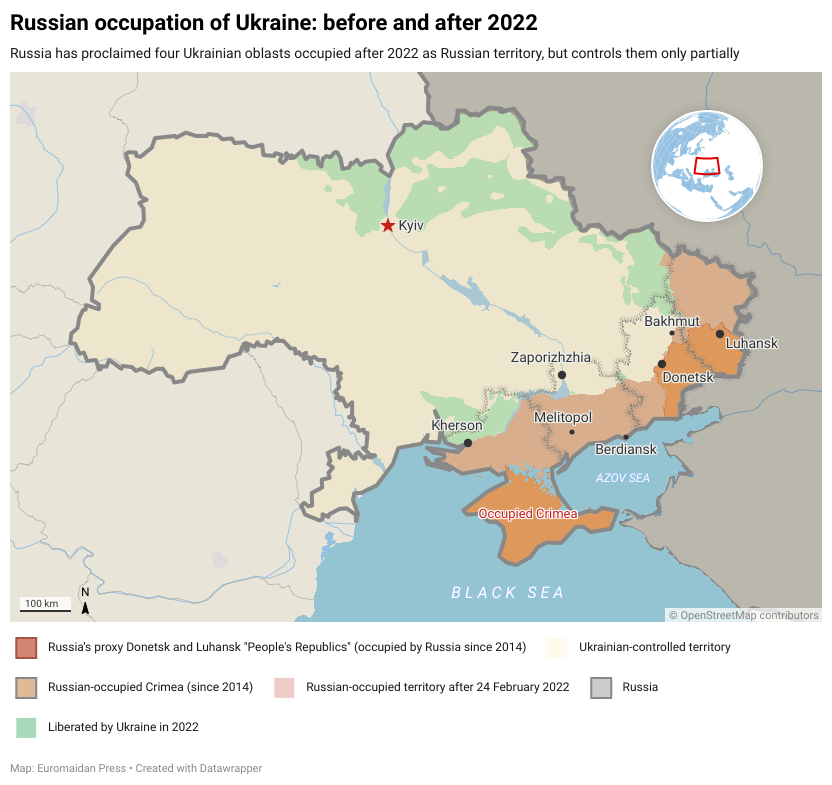
Ammunition was always—and is—an issue. The platoon, as the whole Ukrainian army, is suffering from shell hunger.
In 2022, the fighters found some ammunition in Stanyslav and exchanged more with other units for other trophies in the Kherson Oblast. Trophy barter was popular: everyone exchanged whatever they found and joked about the Russian “lend-lease.”
Now, as the West is delaying weapon deliveries to Ukraine, the soldiers recharge fired shell cases, finding propellant through local sources and fitting it into the spent brass cases, then sealing them with “cannon lard”—wax to seal the explosives. “Cannon lard” is cooked in a small enamel pot with red cherries, Soviet-style.
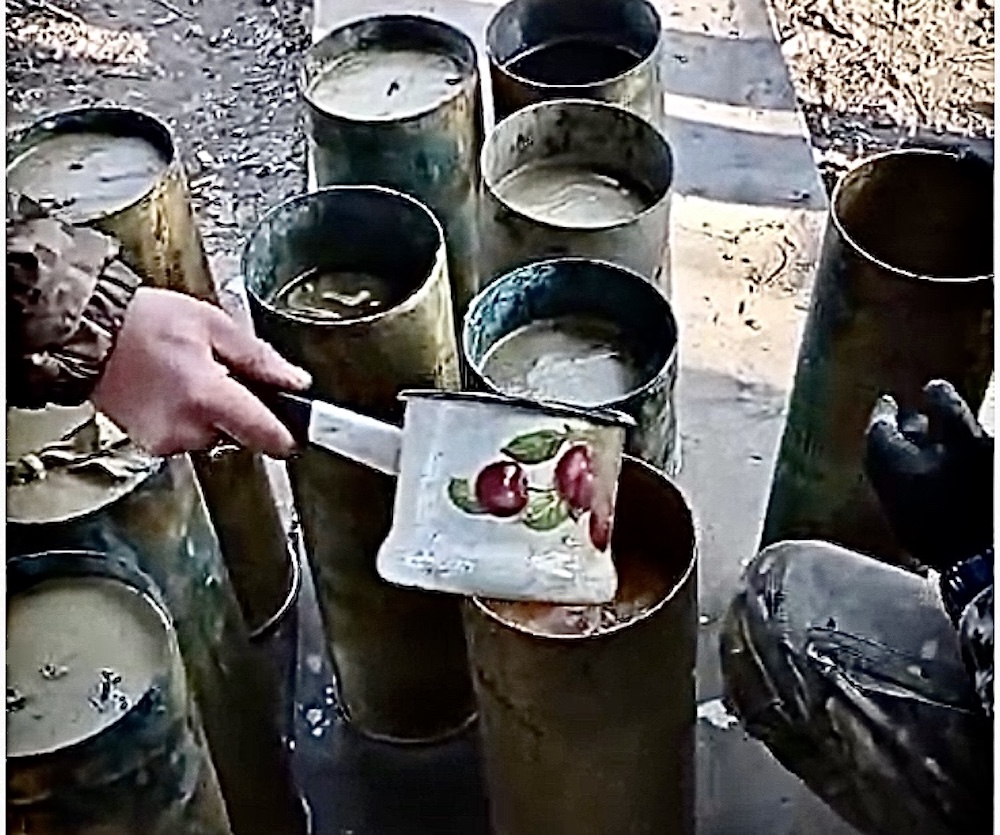
Soviet gun, Soviet shells, the pot. Ukraine is fighting to bury the Soviet past to move to the future of its own choice—without shells.
“There was a time when we shot 80—100 shells a day,” says Dima. “Now, not so much.”
The shells are 42 kg each. Dima can only lift 20 shells at a time and Stiopa can lift more, but, anyway, the platoon needs six people in this position, not four.
The birds start singing outside. The sun is up. Stepping outside for a breath of air or a toilet break is only allowed after checking in with surveillance.
After the third attempt, we get a signal on the radio that it is okay to step out, but not for long. Soon everyone is back on the cots, asleep. The oven is off, and it becomes cold. Everyone is coughing. Apart from a distant grumbling of artillery, there are no other sounds, not even mice.
Last year, soldiers had to share trenches and dugouts with mice all along the frontline, but not anymore. At night, the mice would slip into the sleeping bags through the face opening. Dima and Stiopa brought a cat to the position to catch mice, but it followed them to the dugout. The cat hunted mice outside, bringing them inside to play, and was sent back home.

There were enough animals around here anyway. When people fled villages, they left behind dogs, cats, and even pigs. The pigs went wild and would eat just anything, including the bodies of dead Russian soldiers. Eating pork after that was a whole different matter, says Dima.
At 11 a.m., Dima, Stiopa, and Sasha offer us buckwheat, fried duck, smoked meat, and ribs, and talk about making pea soup, frying sausages, and making sandwiches. They don’t cook in the dugout. A kettle is boiling at a gas burner. Drinking too much tea or coffee is not an option, as leaving the dugout too often is risky.
After lunch, everybody returns to waiting for a signal from the air surveillance. Sasha is snacking on sunflower seeds. Dima is dozing, sitting, with his head in his arms. Andriy is asleep on his cot. Stiopa is just sitting, staring into space. When he gets up, he falls: his leg fell asleep. Andriy is asleep. Not a sound—the nearby positions are dead-quiet too.
Dima shows a video of a decoy Russian position, a rather surreal sight: fake tanks and vehicles, mannequins in camouflage fixing fake tanks, and using a fake toilet.
At midday, Russians start shelling, and a couple of explosions rock close by. Waiting goes on for three more hours, with an occasional bang outside. After checking in with the surveillance, I step out. The light hurts my eyes. I hear a drone in the distance and artillery fire from the other side of the Dnipro River.
Back in the dugout, Dima is talking to his family on the phone. He tells his kid to stop playing computer games and do homework and advises his wife to have some soup for lunch. She complains about the weather: cold and windy. They are in the middle of a small disagreement about a kitchen sink repair, when Dima shouts, “Work!”
Preparing to fire. A soldier carries a shell. Photo: Zarina Zabrisky.
Everyone’s up. The gear is on. The platoon is outside, by the gun. Andriy adjusts the fuses on the shells. Sasha fills them with the gunpowder. They insert the shells. Dima shouts, “Fire!” Stiopa pulls a rope. The gun fires. Thunder and flames. Yellowish smoke bursts, mixed with splinters of wood and clods of clay. The air smells burnt. Repeat! Again! “Mask the gun!” shouts Dima. The gun is covered with sticks and camouflage nets. Everyone is back in the dugout.
Inside feels different. Gone is the sleepy, lazy silence. Men stand around, smoking. Eyes are glistening in the dusk.
“What was the target?” I ask.
“Putin came and we chased him out,” says Sasha.
It took about 15 minutes from the moment they got the target to the smoke break. Then they wait again—and, sometimes, the wait can last for days. There is a silver lining, says Stiopa: if we shoot too often, Russians can figure out the location and attack it with drones or artillery.
Eventually, it happens, and the platoon has to leave, tow the cannon, find another place, and start digging again. Farmers will find a way to use these dugouts one day after Victory, says Dima.

In a couple of hours, the crew gets another target and a peculiar task. Volunteers help the brigade with donations and have asked for a special birthday greeting. Dima writes on a shell, “Happy 80th birthday, Ms. Halyna!” The shell is shot at the invaders’ dugout across the river.
“What do you wish for the Russians?” I ask Andriy.
“I wish they go back to where they came from. And, they just received what I wish them.”
“What is the hardest part of your job?”
“Not being able to do it,” everyone says. “We need ammo to free our land.”
Related:
- Zelenskyy: Ukraine has no ammunition for offensive, only defense, builds fortifications
- CNN: Munition shortages pose dire threat to Ukraine, say Western officials
- Want to know how Ukraine can resist Russia in 2024? Look to Bilohorivka

